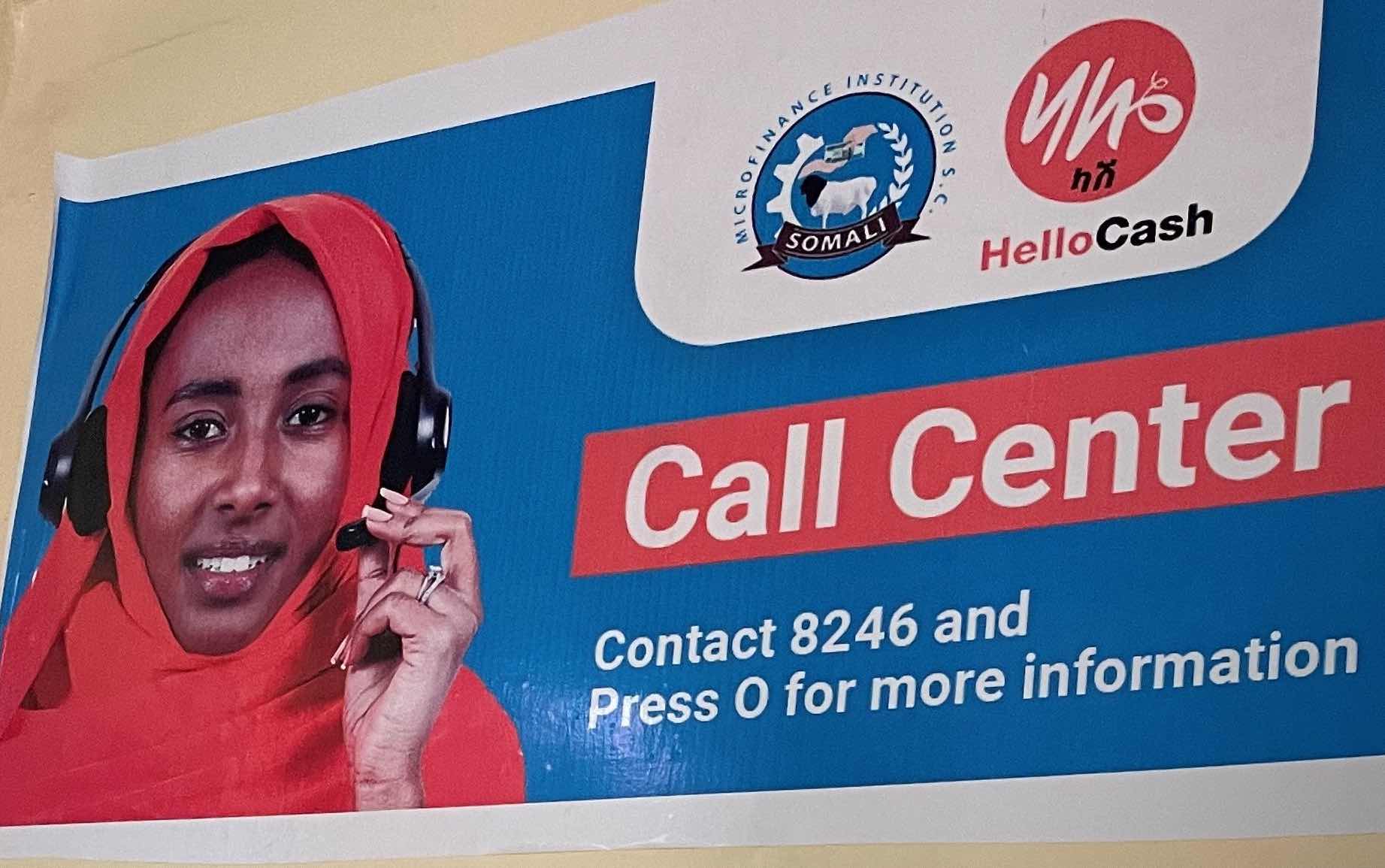In the Somali region of Ethiopia, host to several refugee camps, less than 8% of residents report having access to financial systems, according to the most recent Ethiopia Living Standards Measurement Study (LSMS) data. Expanding financial access has the potential to reduce poverty and is important to food security—and in refugee hosting areas, improving financial systems can help local markets grow and function more smoothly, and thus better integrate refugees with the host community.
In response to this challenge, IFPRI researchers, working with Dadimos Development Consultants, are collaborating with the Strengthening Host and Refugee Populations in Ethiopia (SHARPE) market systems development program to better understand and improve the workings of the financial market system in the Somali region.
To try to increase financial access, particularly among women and refugees, SHARPE has partnered with Shabelle Bank (formerly Somali Micro-Finance Institution) to promote the HelloCash mobile money system in two parts of Ethiopia’s Somali region that host refugee camps: Jijiga and Dollo Ado. Now, a new pilot program designed by IFPRI, SHARPE, and Shabelle Bank will test a community referral system to encourage more women and refugees to sign up for and use HelloCash, and examine how various various targeted incentives for referrers work.
Numbers can mask underrepresentation of some groups
In general, the goal of increasing financial access through mobile money has been quite successful—as of the end of February 2022, over 50,000 new customers had enrolled in HelloCash. However, there are two ways that the sheer number of new customers might mask progress towards both project and Shabelle Bank goals.
First, the number of sign-ups for HelloCash by women and refugee customers remain short of goals, according to SHARPE (and consistent with our scoping research). New methods of reaching out to those underrepresented customers are needed to ensure that the financial market system reaps the benefits of inclusion.
Second, new sign-ups for HelloCash may not consistently translate to active usage of the platform. Companies offering mobile money profit only when customers use their systems; similarly, customers will not benefit unless they engage with and use those systems. So different approaches may help to translate more sign-ups into customer participation.
The idea behind the new pilot program, currently underway, is to incentivize particularly active customers within underrepresented groups to persuade potential new customers in their social networks about the benefits of the system, using language they understand and examples that feel relevant for them. Current active customers would receive a small cash reward for each new customer they refer who signs up for the service. Thus Shabelle Bank may be able to attract customers who will transact more often, and more customers in underrepresented groups, particularly women and refugees.
The community referral pilot has two different features that aim to help meet inclusion-related enrollment goals. First, active customers who will be making the referrals were drawn from SHARPE’s target areas for expanding inclusion. Using a database of HelloCash users in these areas, we developed eight strata of “community referrers” based on different combinations of traits: Region (Jijiga, Dollo Ado), gender (male, female), and refugee status (refugees, non-refugees). From each of the eight strata, we selected the best 100 customers in terms of highest transaction volume, who agreed to participate in a baseline phone survey.
Second, we are testing whether varying the “referral reward” for different types of new customers changes who signs up. Specifically, community referrers will be randomized into four groups: Low bonus, mixed bonus, high bonus, and a control group. The low bonus group will receive 25 birr ($0.50) for any referral; the high bonus group will receive 50 birr ($1) for any referral; the mixed group will receive 25 birr for referring a new male customer but 50 birr for a new female customer, to better incentive female enrollments. By stratifying the referrers, we hope to identify how referrer characteristics relate to those of new customers who successfully sign up.
Building on findings
Results of the community referral program will be shared with Shabelle Bank during the pilot, so any adaptations needed can be made. At the end of the pilot in September 2022, we will present statistics on the number of sign-ups and on usage by those who signed up. We will compare those statistics with the general population of users to help ascertain whether it makes business sense for Shabelle Bank to adopt any of these referral schemes into their normal business.
The study results will feed directly into IFPRI’s larger impact evaluation of the SHARPE project’s engagement in the financial market system. SHARPE’s activities include a complex set of actions aimed at making the financial market system more inclusive and accessible. The project is engaging both with mobile money providers and with regulators, who have relaxed requirements for businesses operating in refugee camps to become mobile money agents. The overall evaluation will employ mixed methods research to understand the impacts of SHARPE’s activities on financial market activity, and also on livelihoods among refugees, host community members, and by gender.
Alan de Brauw is a Senior Research Fellow with IFPRI’s Markets, Trade and Institutions Division; Daniel O. Gilligan is Deputy Director of IFPRI’s Poverty, Health, and Nutrition Division (PHND); Shalini Roy is a PHND Senior Research Fellow.
This work is funded by the Centre of Excellence for Development Impact and Learning (CEDIL), which is funded by the UK Foreign, Commonwealth & Development Office (FCDO). A version of this post appears on the CEDIL blog.







